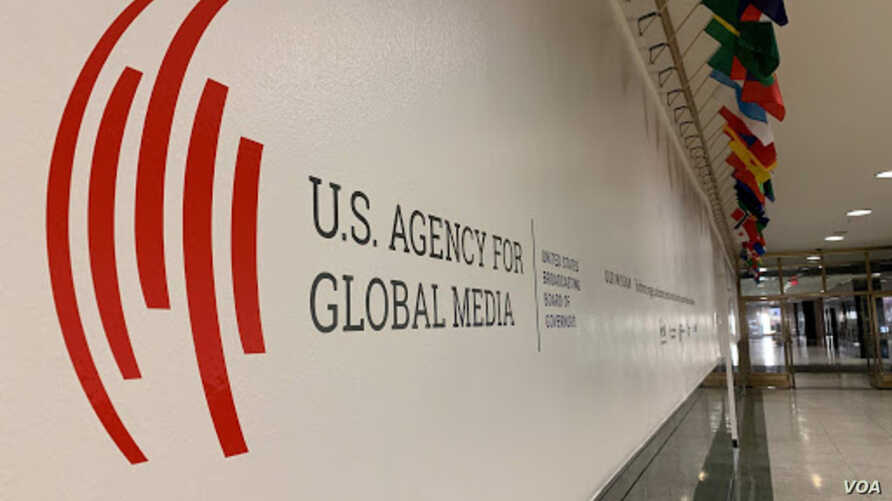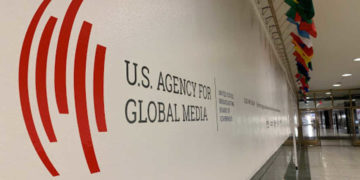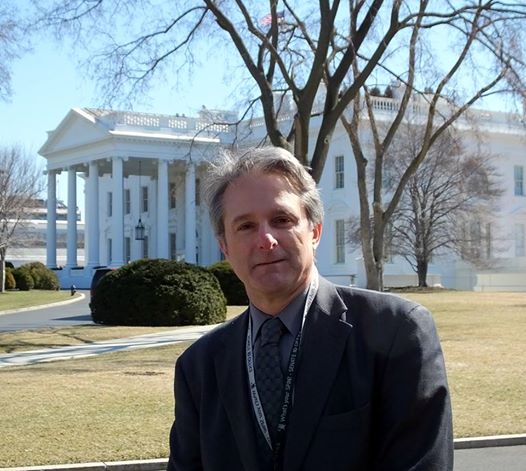For years, the U.S. Agency for Global Media has ignored the VOA Charter and has shifted the focus to “nation-building.”
A Guest Commentary
By The Federalist
One of the resources we use to monitor the U.S. Agency for Global Media (USAGM) is the State Department Office of the Inspector General (OIG), which has oversight responsibilities over and issues reports about USAGM and its operations.
Here is a link to a recent OIG report:
Fiscal Year 2022 Inspector General Statement on the U.S. Agency for Global Media’s Major Management and Performance Challenges | Office of Inspector General.
The summary of the report states:
“Each year, in accordance with the Reports Consolidation Act of 2000, the Office of Inspector General (OIG) for the U.S. Agency for Global Media (USAGM) identifies the most significant management and performance challenges facing the agency and briefly assesses progress in addressing those challenges. The resulting report is included in the agency’s annual performance and accountability report. OIG identified the following management challenges in fiscal year (F.Y.) 2022:
Information Security and Management
Financial Management
Contract and Grant Management
These issues go to the core of USAGM’s programs and operations. Continued attention to these concerns will improve USAGM’s operations and, accordingly, its ability to fulfill its underlying mission. OIG provides this report so that, taken together with the work OIG produces throughout the year, USAGM can institute appropriate measures to improve operational efficiency and effectiveness.”
From the perspective of many years of watchdog efforts by BBG Watch and USAGM Watch and the work of various congressional committees, along with media reports, we would observe that there is a lot more that is wrong with this agency than what this OIG report focuses on.
It claims that “These issues go to the core of USAGM’s programs and operations…”
Well, in some respects, yes and in others, no.
These are important support functions, but they are not mission functions. To be sure, things that are wrong in the support functions make things difficult in the mission functions. However, what is wrong with the mission functions goes much further.
The core of what this agency does (mission functions) is embedded in the Voice of America (VOA) Charter. For years, the agency has ignored the VOA Charter and has shifted the focus to “nation-building” in the form of the mission statement that says the agency operates “in support of freedom and democracy.”
The VOA Charter
1. VOA will serve as a consistently reliable and authoritative source of news. VOA news will be accurate, objective, and comprehensive.
2. VOA will represent America, not any single segment of American society, and will therefore present a balanced and comprehensive projection of significant American thought and institutions.
3. VOA will present the policies of the United States clearly and effectively, and will also present responsible discussions and opinion on these policies. (Public Law 94-350)
The VOA Charter is clear on what constitutes free and objective journalism. What constitutes “freedom and democracy” is open to interpretation. Worse, lessons that this agency and U.S. foreign policy, in general, fail to acknowledge is that what we consider to be “freedom and democracy” has served the United States well over its history but is a very difficult export product if it has to be sold rather than being already widely accepted. USAM’s surrogate broadcasters should have provided a free press substitute for the censored domestic media, but they can’t function freely and effectively under the dysfunctional federal government bureaucracy in Washington.
And the failures of ignoring the VOA Charter have been major–most recently, in Afghanistan, after nearly 20 years of heavy agency in-country presence and in-country broadcasting. The agency leadership and journalists became so complacent and subservient to the local authorities that they did not foresee the rapid takeover of the country by the Taliban and left hundreds of their own employees, contractors, and family members stranded in now one of the most dangerous places in the world. 20 years of supporting nation-building, freedom, and democracy did not prevent a brutal dictatorship from returning.
And there is one other flaw in embracing this slogan. It ignores the following:
“Ideals are peaceful. History is violent.”
While the subject matter of the OIG report is indeed important, so too is how the agency has drifted from its intended mission, the negative consequences arising from it, and the ongoing cover-up of just how bad the agency’s failure is.
Worse is the embrace of ideology in the name of “journalism” or “a free press,” both of which the agency has made into hackneyed phraseology.
At USAGM, scandals abound. The latest is the caving-in of the Voice of America leadership to the demand from the Washington Embassy of communist Vietnam for censorship of a VOA Vietnamese Service news report and video that embarrassed the Vietnamese Prime Minister. To the horror of the VOA Vietnamese Service journalists, Voice of America’s senior leaders quickly complied with the foreign government’s request to change VOA programming. Radio Free Asia (RFA), however, did not censor the same report and video. VOA has been more damaged by the agency bureaucracy than some of the surrogate broadcasters, but they also suffer from USAGM’s growing dysfunction.
Paul Farhi, the Washington Post reporter, had this quote from a VOA Vietnamese Service staffer:
One frustrated employee described it as a betrayal of the organization’s values and mission. “It’s detrimental to our reputation as a news outlet,” said the staff member, who asked not to be named to avoid retribution. “Our slogan is ‘A free press matters.’ This is so ironic.”
Paul Farhi, “Voice of America removes story that embarrassed Vietnam’s prime minister: A story about undiplomatic comments by Vietnamese Prime Minister Pham Minh Chinh caught on a hot mic went viral — before the U.S.-funded news agency removed it following complaints from his embassy,” The Washington Post, November 15, 2022.
Coverage of events is seen to be less than trustworthy objective journalism and more as reflecting the blatant ideological bias and the senior management’s personal and bureaucratic interests. Worst of all, all that is wrong with the agency appears to have accelerated under Amanda Bennett, first as VOA director in both the Obama and Trump administrations and now as CEO of the agency in the Biden administration.
Bennett has demonstrated no effective managerial expertise in running a large organization while she was VOA director. Neither do the people who have embedded themselves in senior agency positions, remaining there for decades.
At one point, Bennett asserted that these individuals were a “fantastic leadership team” even though the agency has established itself as one of the worst in the Federal government and expanded and built upon that reputation during Bennett’s time as VOA director. That combination makes it easy for waste, fraud, and abuse to thrive in the Cohen Building that houses USAGM.
Another recent OIG report pointed out that the failures of journalistic controls and standards happened mostly at the USAGM’s federal entities: the Voice of America and the Office of Cuba Broadcasting (OCB).
Furthermore, OIG found the networks generally had appropriate oversight of editorial controls, program reviews, and procedures to respond to violations of journalistic standards and principles, with exceptions at OCB and the Voice of America (VOA).
Office of Inspector General, United States Department of State, “Targeted Inspection of the U.S. Agency for Global Media: Editorial Independence and Journalistic Standards and Principles
ISP-IB-23-01,” October 2022.
In short, there is no reasonable expectation that Bennett and her senior aides are capable of effective remedial action, either with regard to the latest OIG report or in any other manner.
To get at the heart of what the agency has become, one first has to acknowledge that the agency is wholly dysfunctional, almost from top to bottom. Failure to recognize this, as has been the case for at least two decades, perpetuates the dysfunction.
Without accountability, agency officials are not incentivized to address agency weaknesses, created mainly by them. OIG reports come and go, but there is no effective follow-up by Congress or by the White House.
Rarely has the agency been examined critically and in detail, particularly concerning its largely unilateral and oversized claims of audience size, or for real as opposed to imagined impact and effectiveness in its mission. In truth, any reading of daily headlines tells a very different story, with the world roiled in violent conflicts and obvious departures from “freedom and democracy.”
This agency is not likely to have any meaningful impact and effectiveness as long as it is locked on conceptual ideological outcomes rather than solid and sober journalism. The only thing that we can be reasonably confident of is that people responsible for the agency’s failure will remain ensconced in their positions until they can retire on a very generous pension.
Make no mistake, this is their top priority, and to secure it means practicing “business as usual.”
You can also be sure that they will craft reams of paper in the form of responses to OIG reports, congressional inquiries (when those occur), press releases, and the like extolling what a great job the agency is doing.
The obvious truth is that it’s not. Other than protecting those responsible, the only other thing the agency has done successfully is waste billions of taxpayer funds in its gross display of incompetence and hypocrisy. In short, the agency has made its own case that it has to go.
This agency provides no meaningful function as part of U.S. foreign policy, or as is often referred to, “public diplomacy.” As far as its other claim of being “an independent news company,” the most informed individuals know that to be false and that the agency should be seen as masquerading as such.
USAGM is grossly irrelevant globally, and, consequently, ignored by U.S. officials and media. If it had a chance at justifying its existence, that window of opportunity closed decades ago with the convergence of the end of the Soviet Union and the exponential explosion of international media.
The agency may have some minor residual following, but it has been significantly diluted by regional and local media as well as the powerful presence of other international media. In short, it is being drowned out and is struggling to keep its broadcasting head above water.
One example: in early 2022, as Russia began its invasion of Ukraine, there were few if any instances in which major television anchors or their guests actually made mention of the existence of USAGM and its various outlets.
Over the years, the OIG has built up an enormous archive of issues that reflect negatively on those individuals running the agency. But the overriding point remains: someone has to act to rid the government of this corrosive and dysfunctional drain on national resources and funding.
Res ipsa loquitor.
“The matter speaks for itself.” The reoccurrence of scandals implies the negligence of those charged with overseeing the agency.
The Federalist
December 2022










